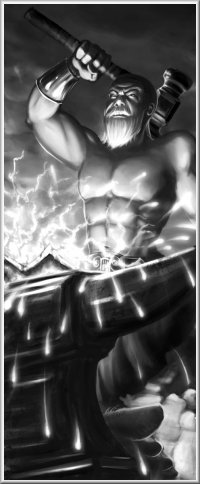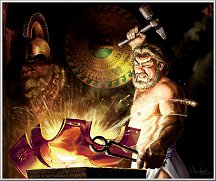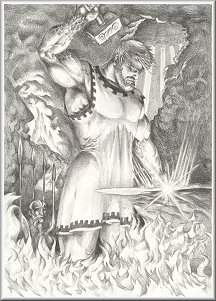
Hephaestus by Alayana
CLICK
TO ENLARGE

Hephaestus
CLICK
TO ENLARGE

Hephaestus
CLICK TO ENLARGE
|
HEPHAESTUS PAGE ONE
Hephaestus was the God of Fire and the Forge, the patron god of
smiths, craftsmen, sculptors and artisans. He was the weapon
maker of the gods and god of metal, fire and volcanoes. His
chosen attributes and symbols are a smith's hammer, an anvil and
tongs.
He was the son of Zeus and Hera, although it is sometimes said
that Hera conceived him by herself and without any help from
Zeus. Hera wanted to get back at Zeus because she was angry at
her husband for birthing Athena from his own head without first
procreating with her.
Of all the gods, Hephaestus was the only one to be physically
ugly, and he was also lame. But of all the gods, it was the
deformed Hephaestus who created the greatest works of beauty.
There are two slightly different accounts of how he became lame.
One version is that Hera was so upset at having an ugly child
that she flung him off Mount Olympus and into the sea, breaking
his legs in the process.
Later, Hephaestus took revenge on his mother by building her a
golden throne which bound her with invisible fetters when she
sat on it, and would not release her until Hera had agreed to
all his demands.
The other version of his birth is that Hephaestus tried to, and
almost did, free his mother when Zeus punished her by hanging
her on a golden chain between heaven and earth; and Zeus, in
anger in at his son’s interference, hurled him off Olympus
himself.
But most sources claim that Hephaestus landed in the sea near
the island of Lemnos, and was washed up by the surf on the
shore, where his body lay broken until rescued by the Nereids,
the famous sea nymphs Thetis (mother of Achilles) and Eurynome
(mother of the Three Graces).
These beautiful Nereids took great care to hide him from his
mother who, still ashamed of her deformed son, would have
continued to try to harm him.
Secretly Hephaestus lived with these goddesses in their
underwater caves for nine years, and that was the awakening his
creative energy.
There, the gifted god began to craft beautiful jewelry from the
multi-colored underwater coral reefs, and from the variety of
precious metals found underwater.
To compensate for his lameness, Hephaestus built two golden
robots to help him move around, and also the twelve splendid
thrones of Olympus, a unique one for each of the major Olympian
gods and goddesses.
Helped by the Cyclops, who were master craftsmen in their own
right, he continued to develop his skills with decorative iron
and other metals, creating beautiful gifts for his surrogate
mothers, the Nereids.
It wasn't long before Hera saw Thetis wearing some of the
beautiful jewelry that Hephaestus had created and demanded to
know the source of this divine craftwork. She could tell that no
mere mortal could create anything resembling such exquisite
work.
When she learned it was her own son Hephaestus, she realized
that although physically deformed, her son was capable of
unsurpassed creations. All of a sudden his deformity didn't
matter.
Hera at once forgave him for not being all she had hoped for,
and asked for her husband Zeus to return him to his rightful
place up on exalted Mount Olympus.
But Hephaestus was quite happy living on Lemnos and was still
understandably angry at his mother for her past treatment of
him. He refused to comply with the order.
Finally, Zeus resorted to trickery. The King of the Olympians
sent Dionysus, Hephaestus' brother and the god of wine, to
intoxicate him and persuade him to return.
Hephaestus had never experienced wine, and was drunk in no time.
Thus out of his mind, and agreeable to just about anything,
Hephaestus then mounted a donkey and, accompanied by Dionysus,
rode back to the palace at Mount Olympus.
Hera wisely declared him her son, even though Hephaestus himself
claimed to have no mother, and that was how he returned to his
rightful place and became one of the Olympians. Many ancient
Greek vase painters were fond of depicting Hephaestus'
triumphant return to Olympus.
 CONTINUED ON PAGE TWO
CONTINUED ON PAGE TWO

Hephaestus continues on page two!
Lots more info and pix - Click here!
(see a list of his fabulous creations!)

[home] [page one]
[page two]
|







